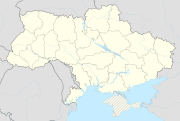Sabolotiv
| Sabolotiv | ||
| Заболотів | ||

|
|
|
| Basic data | ||
|---|---|---|
| Oblast : | Ivano-Frankivsk Oblast | |
| Rajon : | Snyatyn Raion | |
| Height : | no information | |
| Area : | 1.91 km² | |
| Residents : | 4,129 (2001) | |
| Population density : | 2,162 inhabitants per km² | |
| Postcodes : | 78315-78316 | |
| Area code : | +380 3476 | |
| Geographic location : | 48 ° 28 ' N , 25 ° 17' E | |
| KOATUU : | 2625255300 | |
| Administrative structure : | 1 urban-type settlement , 11 villages | |
| Mayor : | Ivan Dmytrovytsch | |
| Address: | пл. С. Бандери 3 78315 смт. Заболотів |
|
| Statistical information | ||
|
|
||
Zabolotiv ( Ukrainian Заболотів ; Russian Заболотов Sabolotow , Polish Zablotow , German rarely Zablotow ) is an urban-type settlement of Ivano-Frankivsk Oblast in western Ukraine . The settlement is located on the upper reaches of the Prut at the foot of the Carpathian Mountains , on the eastern edge of the area that is part of the historical landscape of Galicia .
On July 24, 2017, the settlement became the center of the newly established settlement community Sabolotiv ( Заболотівська селищна громада Sabolotivska selyschtschna hromada ). At this still count the 11 villages Hankiwzi (Ганьківці), Illintsi , Ljubkiwzi (Любківці) Oleschkiw (Олешків) Roschnewi Polya (Рожневі Поля) Rudnyky (Рудники) Schewtschenkowe (Шевченкове) Sibraniwka (Зібранівка) Trojizja (Троїця) , Trostyanets (Тростянець) and Wyschniwka (Вишнівка). Until then it formed the settlement council of the same name.
history
The village in the Ruthenian Voivodeship of the Kingdom of Poland was first mentioned in documents in 1455 . After the division of Poland in 1772, the area came under the Habsburg monarchy as part of Galicia . Between 1854 and 1867 the place was the seat of a district commission, then until 1918 the seat of a district court of the Śniatyn district . In 1790 the Jewish community ( shtetl ) was founded. In 1903 there was a pogrom in the Hasidic community, in which 40 Jewish residents were injured, some seriously. The pogrom came almost exclusively from the Ruthenian ( Ukrainian ) rural population, who accused the Jews of their loyalty to the Poles that dominated Galicia . In 1910, 2,171 Jews and 2,587 others, mostly Ruthenians, lived in Zablotow.
Manès Sperber describes his place of birth and his shtetl in his autobiography :
“Zablotow - the name itself is uncomfortable: it alludes to the loamy soil, to the unpaved streets, in which one threatened to sink as soon as the incessant autumn rains had softened them. ... Did I speak of the poverty of the city? The word is misleading because it is entirely inadequate. Hardly ever really filling oneself was the fate of most ... How many starved, nobody starved. ... Moreover, they [the Jews] avoided the villages [of the Ukrainians] as much as possible because they rightly feared they would encounter hostility there. Nevertheless, the towns were not ghettos , but in essence as well as by definition the opposite. A town was not the appendage of a Christian community within the ban mile , not a discriminated foreign body within a higher civilization, but on the contrary, a sharply profiled autonomous community with a peculiar culture - this in the midst of poverty and ugliness, and encircled by Enemies of the Jewish faith. The Städtel was a center from which the Slavic villages were peripheral agglomerations whose inhabitants, mostly illiterate , had hardly any connection to the spiritual. "
After the break-up of Austria-Hungary , Sabolotiw became Polish in 1920 . In 1939 the area was occupied by the Soviet Union due to the Hitler-Stalin Pact . In 1941 it was captured by the German army . The Jewish population that was unable to escape in time was murdered in the Holocaust .
economy
In Zabolotiv there are mainly tobacco and food processing plants. Around 400 people, almost a tenth of the total population, work abroad.
Personalities
- Otton Marcin Nikodým (1887–1974), Polish mathematician
- Manès Sperber (1905–1984), writer
- Milo Sperber (1911–1992), actor
Web links
- Entry on the place in the Encyclopedia of the History of Cities and Villages of the Ukrainian SSR (Ukrainian)
- Zabłotów . In: Filip Sulimierski, Władysław Walewski (eds.): Słownik geograficzny Królestwa Polskiego i innych krajów słowiańskich . tape 14 : Vorovo – Żyżyn . Walewskiego, Warsaw 1895, p. 189 (Polish, edu.pl ).
- A City and the Dead. Zablotow Alive and Destroyed Memorial Book of Zabolotov (English)
Individual evidence
- ↑ Відповідно до Закону України "Про добровільне об'єднання територіальних громад" україни "і іІвано-устиканку іІвано-усканку івано-усканку іквано-устиканку івано-устиканку іІвано-устиканку івано-усканку іІвано-устиканку
- ^ Reichsgesetzblatt of April 24, 1854, No. 111, page 401
- ↑ Albert Lichtblau (Ed.): As if we had belonged. Austrian-Jewish life stories from the Habsburg monarchy. Böhlau, Vienna 1999, ISBN 3-205-98722-5 , pp. 22 and 102f.
- ↑ Manès Sperber: The water bearers of God. All the past ... dtv, Munich 1981, ISBN 3-423-01398-2 , p. 14ff.


